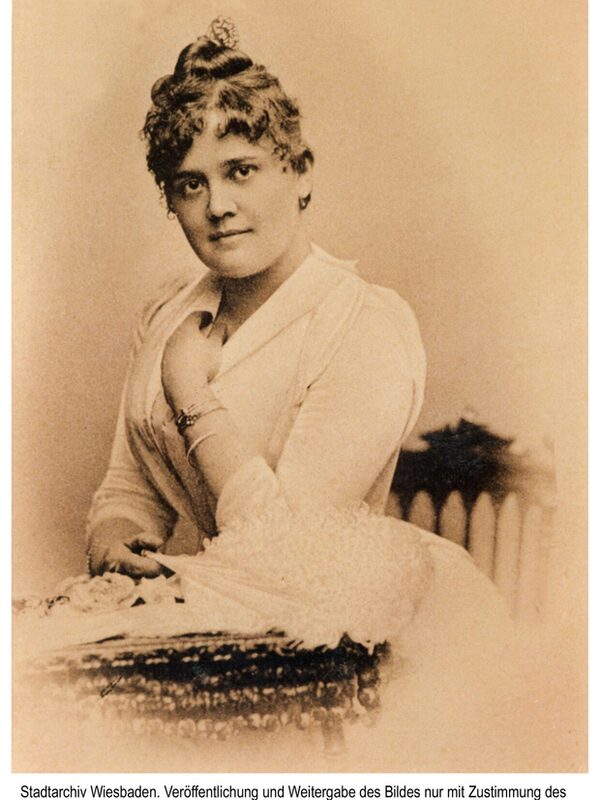Spies, Hermine
Spies, Hermine
Singer (mezzo-soprano)
born: 25.02.1857 in Löhnberger Hütte near Weilburg
died: 26.02.1893 in Wiesbaden
Her father, Friedrich Spies, was related to the Buderus brothers and successively managed their ironworks in Löhnberg, Hirzenhain and Runkel/Lahn. At the age of 14, Spies was sent to the Bernhardt Institute in Wiesbaden.
In addition to her schooling, she received piano lessons and vocal training at the new music school run by Wilhelm Freudenberg, who had come to Wiesbaden in 1865 as conductor of the Cäcilienverein. From 1877, she studied singing in Berlin with the pedagogue and singing theorist Ferdinand Sieber (1822-1895). When Friedrich Spies retired, the family moved to Wiesbaden in 1879 and Spies continued her studies at Dr. Hoch's conservatory in Frankfurt with the well-known baritone Julius Stockhausen (1826-1906).
In Wiesbaden, she performed with the Cäcilienverein in 1880 - as an alto in "Das Paradies und die Peri" by Robert Schumann and Handel's "Messiah". Her breakthrough role was the alto part in Schumann's oratorio "Der Rose Pilgerfahrt" in Frankfurt in 1882. This was followed by further concerts throughout Germany, including songs by Schubert, Schumann and Brahms. She met Brahms in 1883 after a concert in Krefeld, and further encounters followed in Wiesbaden. Brahms saw her as the ideal interpreter of his "Alto Rhapsody" and composed several songs for her. They subsequently performed together at several concerts.
Spies went on concert tours throughout Europe and turned down offers as an opera singer. She was soon regarded as one of the most important alto singers in Europe. Her repertoire also included works by Johann Sebastian Bach, Joseph Haydn and contemporary composers who are less well-known today. In Wiesbaden, she sang with the Cäcilienverein in Mendelssohn Bartholdy's oratorio "Elijah" in 1889.
In 1891, she took part in the "Middle Rhine Music Festival" here. It was here that she met the Wiesbaden district judge Walther Hardtmuth, whom she married in 1892. She retired into private life and died the following year.
Literature
Jung, Wolfgang: "Nehmt denn hin, ihr schönen Seelen, froh die Gaben schöner Kunst". The choir of the city of Wiesbaden 1847-1997, Wiesbaden 1997.
Renkhoff, Otto: Nassau Biography. Kurzbiographien aus 13 Jahrhunderten, 2nd ed., Wiesbaden 1992 (Veröffentlichungen der Historischen Kommission für Nassau 39) [p. 770].
